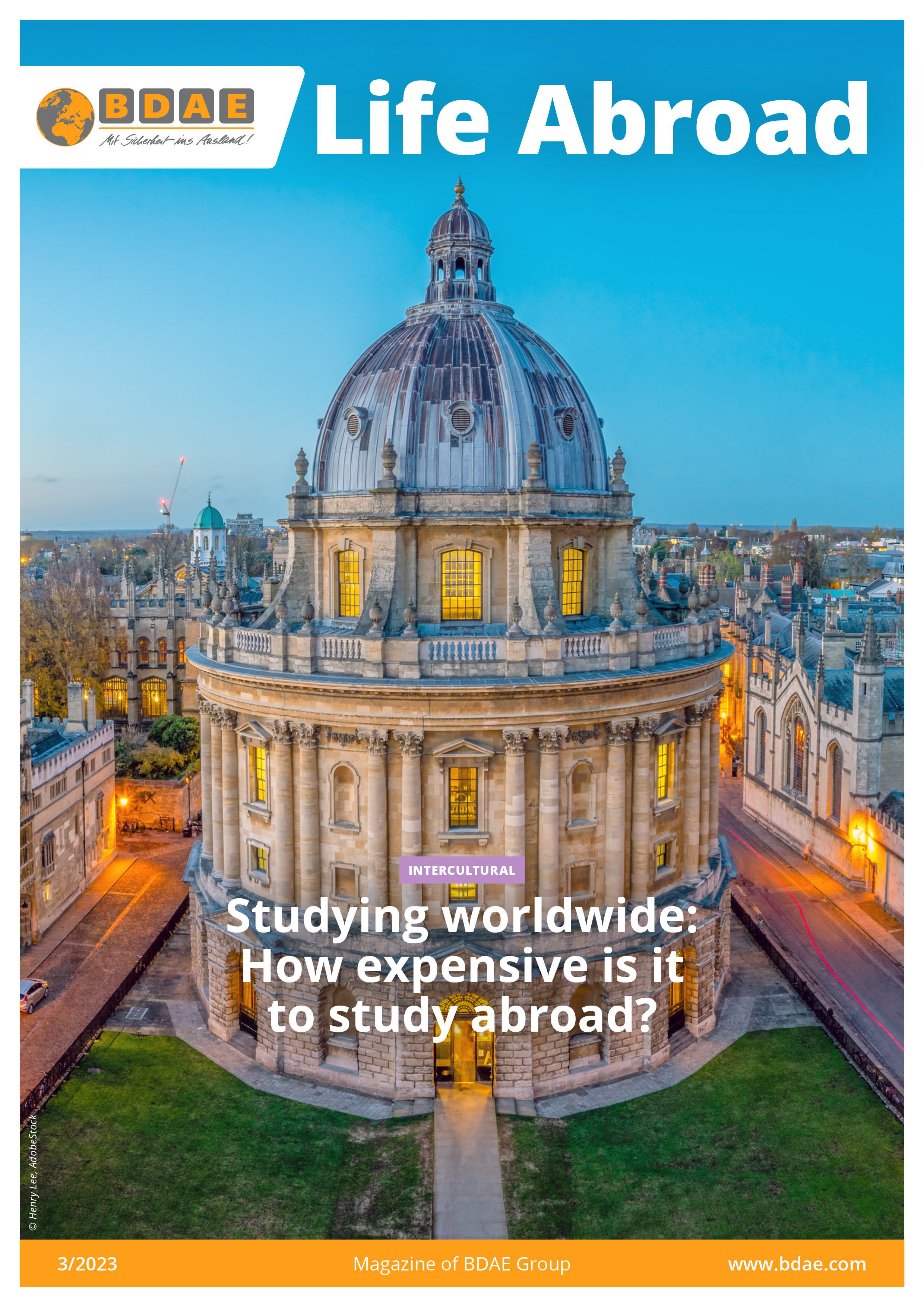In those ten countries, expats face particular challenges
For expats, feeling comfortable in a country is crucial as it can positively impact their job performance, social integration, health, quality of life, and long-term commitment.
Currently, Mexico, Spain, and Panama offer expatriates the best conditions for a successful work life and a sense of well-being on site. However, there are also countries where expats face challenges and find it difficult to adapt.
1. Kuwait: The unhappiest expats worldwide
In the Expat Insider 2023 survey, Kuwait ranks last, confirming the trend of very poor survey results over the past ten years. Kuwait also ranks last globally in terms of quality of life (53rd place). Expats are particularly dissatisfied with their leisure opportunities. About half of them also feel they cannot express their opinions openly, more than triple the global average (15 percent). The availability, cost, and quality of medical care are also rated below average.
Kuwait's poor performance in the subcategories of friendliness, making friends, and culture & welcome places it at the bottom of the list in the Adaptation Abroad Index. More than one in three expats (36 percent) find it difficult to adapt to the local culture (compared to 18 percent worldwide), and only 37 percent are satisfied with their social life in Kuwait, compared to 56 percent worldwide.
Kuwait also ranks among the ten countries with the worst reviews worldwide in the Working Abroad Index. Three out of ten respondents (30 percent) feel they are not adequately paid for their work, and 45 percent say that the work culture in Kuwait offers little or no flexibility.
In the Expat Essentials Index and the Personal Finance Index, Kuwait does not perform much better: only 34 percent are satisfied with the cost of living (compared to 44 percent worldwide). It's worth noting that only 15 percent of expats in Kuwait have difficulty finding accommodation. More than half also find it easy to live there without knowledge of the local language. Overall, only 43 percent are satisfied with life in Kuwait, compared to 72 percent worldwide.
2. Norway: Unfriendly and expensive
Norway ranks second to last in both the global ranking and the Personal Finance Index. More than three out of five expats (62 percent) rate the cost of living negatively, compared to 35 percent worldwide. Additionally, 37 percent say their disposable household income is insufficient for a comfortable life in Norway.
Norway also ranks among the bottom 10 countries in the Adaptation Abroad Index. Nearly one-third of respondents describe the locals as unfriendly to expats, compared to 18 percent worldwide. They also find it difficult to make local friends and are dissatisfied with their social life (38 percent vs. 25 percent worldwide). Overall, 37 percent of expats do not feel at home in Norway.
Norway also does not fare well in the Quality of Life Index. The reasons include high costs of public transportation (29 percent dissatisfied vs. 15 percent worldwide) and limited travel opportunities (14 percent unhappy vs. 6 percent worldwide). Furthermore, the country ranks last in the world for culinary diversity and gastronomy and 51st for culture and nightlife. However, expats appreciate the political stability (88 percent satisfied vs. 63 percent worldwide), high air quality (88 percent vs. 66 percent worldwide), and nature and environment (95 percent vs. 84 percent worldwide).
The Working Abroad Index, on the other hand, is Norway's greatest strength. Expats appreciate job security (1st place) and the economic situation (9th place) but are unhappy with their personal career opportunities (48th place). Overall, only 61 percent of expats are satisfied with life in Norway.
3. Turkey: Long working hours and low job satisfaction
Turkey lands in last place worldwide in the Working Abroad Index: 30 per cent are dissatisfied with their working hours, about twice the global average (16 per cent). Expats do not fare much better when it comes to job security and personal career opportunities (52nd for both). It may come as no surprise, then, that almost a quarter are dissatisfied with working life in general.
Turkey also lands in the bottom ten countries in the Expat Essentials Index (45th place): 16 per cent rate unrestricted access to online services negatively and 15 per cent find it difficult to get fast internet access at home. Turkey still ranks slightly below average on the Quality of Life Index, and is even in second-to-last place on the issue of security.
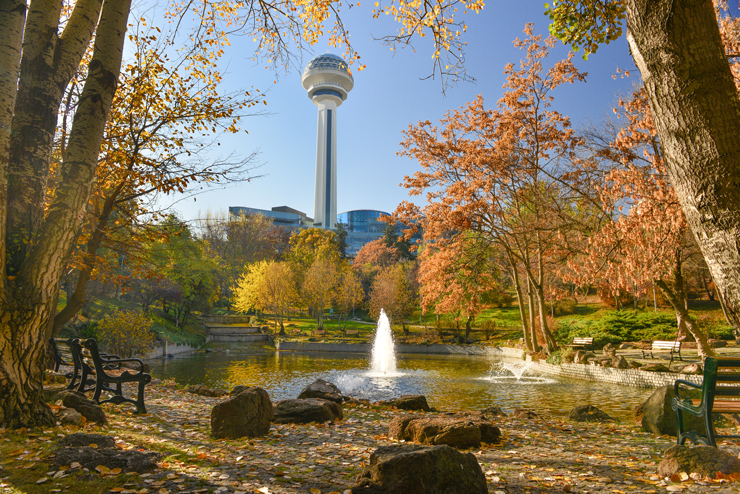 Botanical Garden, Ankara, Turkey. © Orhan Çam, AdobeStock
Botanical Garden, Ankara, Turkey. © Orhan Çam, AdobeStock
In the index on personal finances, 44 per cent of expats are satisfied with the general cost of living, which is in line with the global average, while slightly less than half are satisfied with their financial situation. The country scores best - though still average - in the index on settling in abroad: 45 per cent find it easy to make friends, slightly more than the global average. Overall, 60 per cent of expats are satisfied with their life in Turkey, compared to 72 per cent worldwide.
4. South Korea: Expats there feel restricted by the local (work) culture
In South Korea, expats face the most challenges with adaptation abroad. More than half of them have difficulties making friends locally, and 23 percent rate the overall friendliness of the population negatively (compared to 16 percent worldwide). Additionally, expats in South Korea do not feel welcome or at home.
Expats are particularly unhappy with their work-life balance (51st place), which likely contributes to their low job satisfaction (25 percent dissatisfied compared to 16 percent worldwide). In addition to unfavorable working hours, expats also believe that the local corporate culture in South Korea does not promote creativity, independent work, and flexibility. The result: South Korea ranks among the bottom five countries worldwide in both the Work & Leisure and Working Culture & Job Satisfaction subcategories. Overall, 61 percent of expats are satisfied with their life in South Korea.
5. Germany: The land of lonely expats
Germany has once again received poor results. The Adaptation Abroad Index presents significant challenges for expats in Germany, as the country performs very poorly in all three subcategories: Friendliness, Making Friends, and Culture & Welcome. Three out of ten expats feel that people in Germany are not friendly to foreigners (compared to 18 percent worldwide), and 55 percent find it difficult to make friends (compared to 36 percent worldwide). Since 32 percent also lack a personal social network in Germany (compared to 24 percent worldwide), it's not surprising that about a third of them do not feel at home there (compared to 20 percent worldwide).
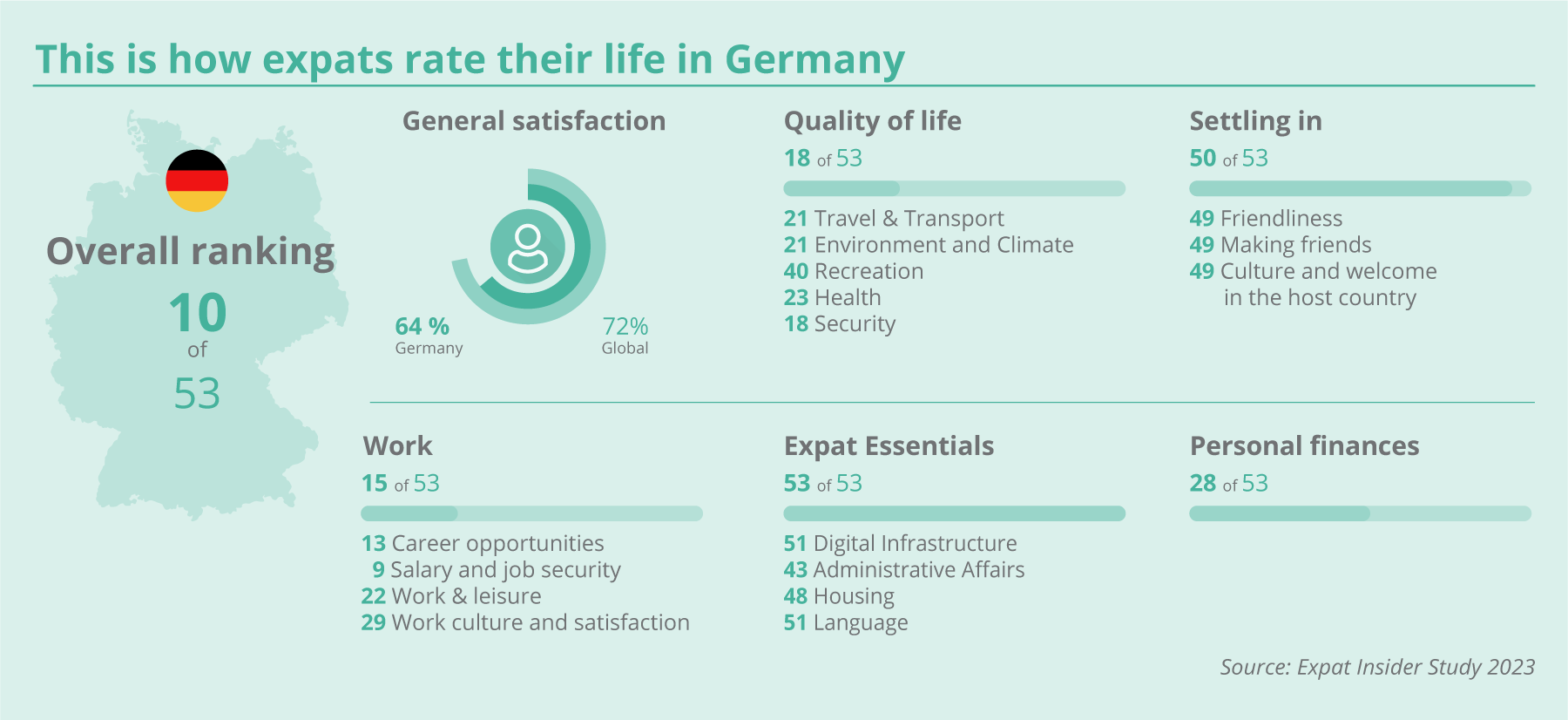
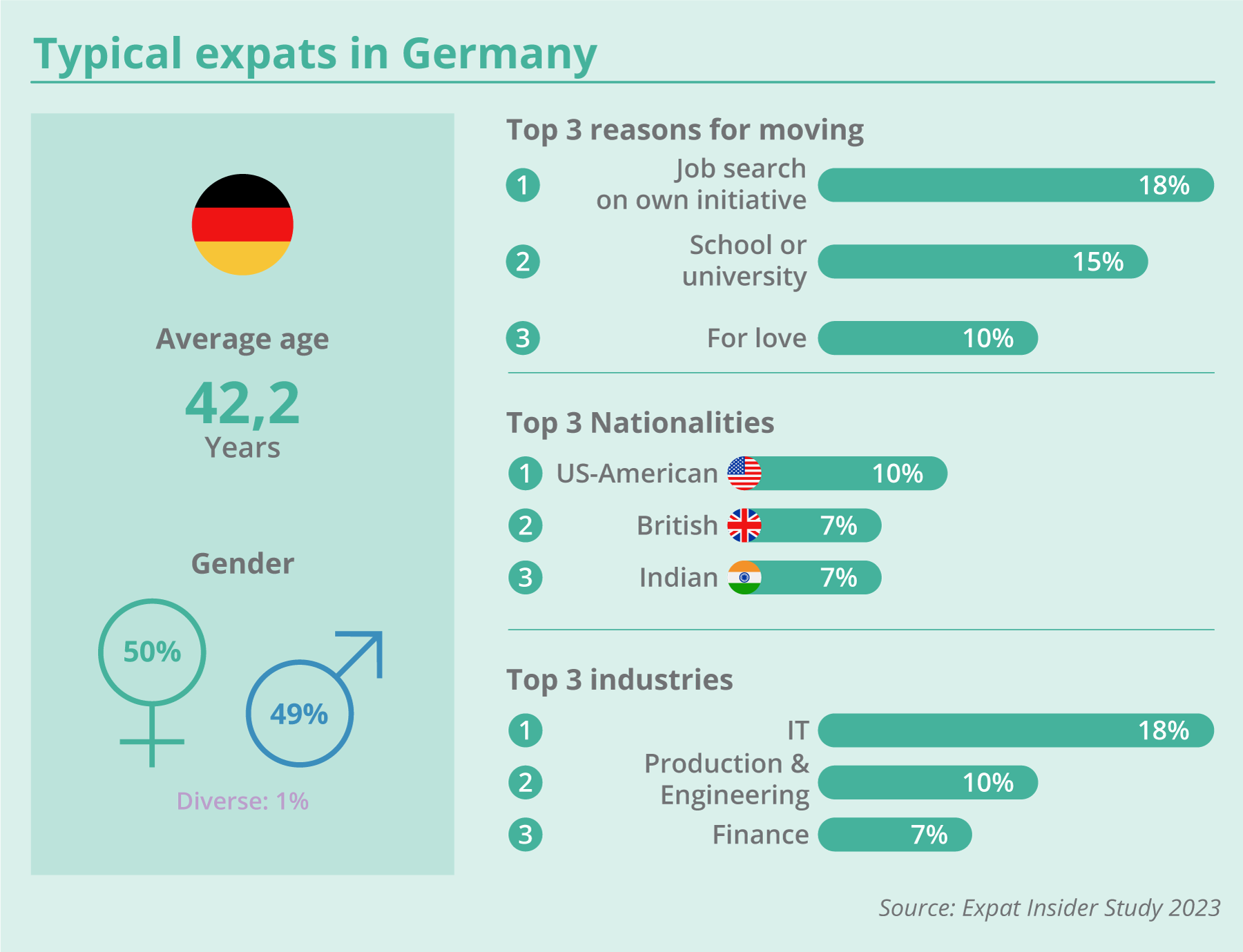
6. South Africa: Not a suitable destination for a career abroad
Expats report many difficulties with their lives in South Africa. Some of the biggest challenges are found in the Working Abroad Index. The country ranks last globally when it comes to the local job market, with more than half of expats rating this factor negatively.
And this is not the only area where South Africa ranks last. It also falls into the bottom ranks in subcategories like Income & Job Security, Travel & Transportation, Safety, and the Quality of Life Index. For instance, 52 percent of respondents rate their personal safety negatively, more than six times the global average (8 percent). The availability and cost of public transportation also receive the lowest ratings globally. However, South Africa earns the 2nd place for climate and weather.
Nearly half of the expats (48 percent) found it difficult to obtain a visa for relocating to South Africa (compared to 24 percent worldwide). Additionally, 72 percent find it challenging to deal with local authorities, nearly twice the global average (38 percent). Overall, 67 percent of expats are satisfied with their lives in South Africa.
7. Italy: A nightmare for working abroad
For expats in Italy, the Working Abroad Index is their biggest weakness. In the Career Opportunities subcategory, the country also ranks second to last. Nearly half of expats are dissatisfied with the job market. Italy also falls into the bottom ranks in terms of working hours and work-life balance. Expats report that the country's work culture does not foster creativity, flexibility (33 percent vs. 18 percent worldwide), and independent work (43 percent vs. 26 percent worldwide). When it comes to overall job satisfaction, Italy ranks last globally.
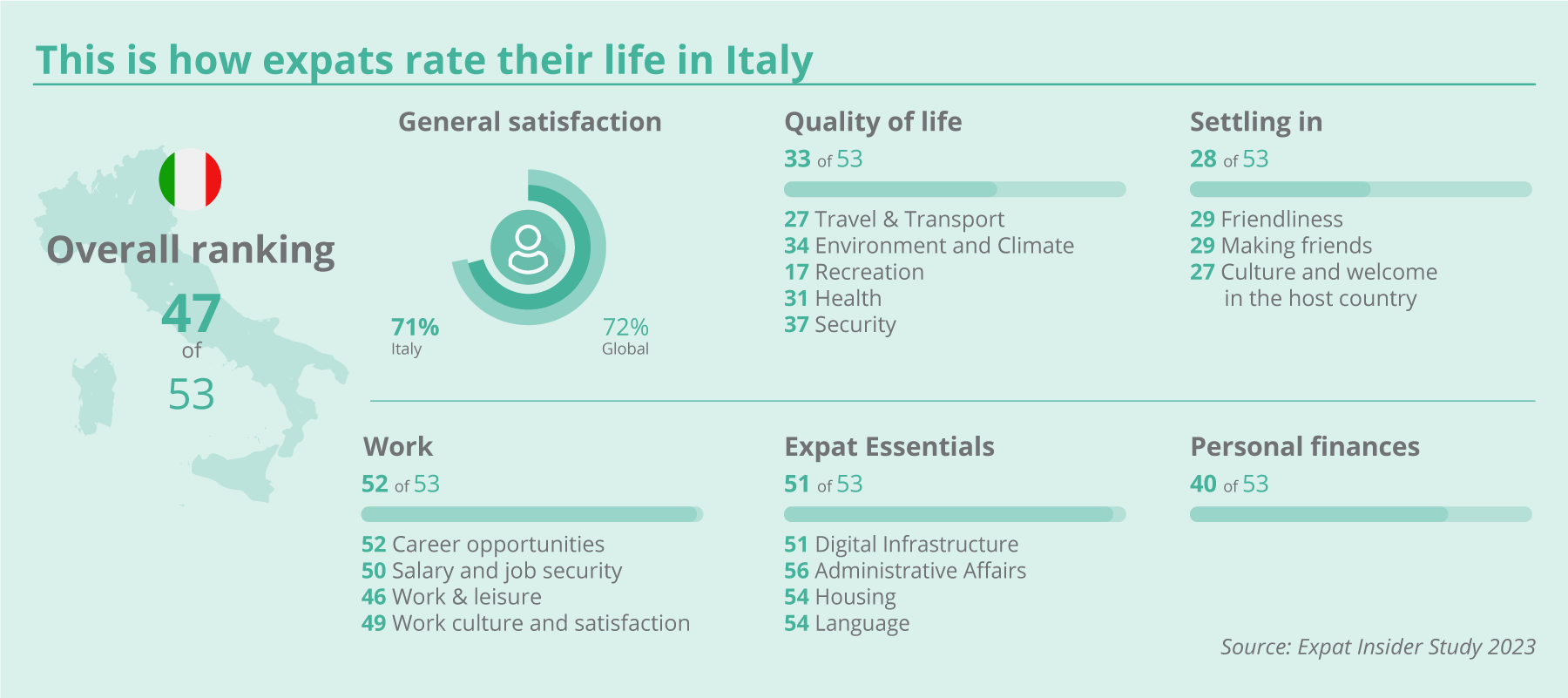
Expats face further problems when it comes to their personal finances. Although Italy is rated slightly above average in terms of cost of living (ranked 25th), one-third are dissatisfied with their own financial situation (vs. 22 percent worldwide). Approximately the same proportion (34 percent) considers their household income insufficient to lead a comfortable life in Italy (vs. 27 percent worldwide).
Italy performs best, but still only moderately, in the Ease of Settling In Index. Results for the Quality of Life Index, however, are more mixed. At least the majority of expats (80 percent) appreciate the culinary diversity and gastronomy, while 72 percent rate the culture and nightlife positively. However, almost a third criticize Italy's political stability (vs. 13 percent worldwide).
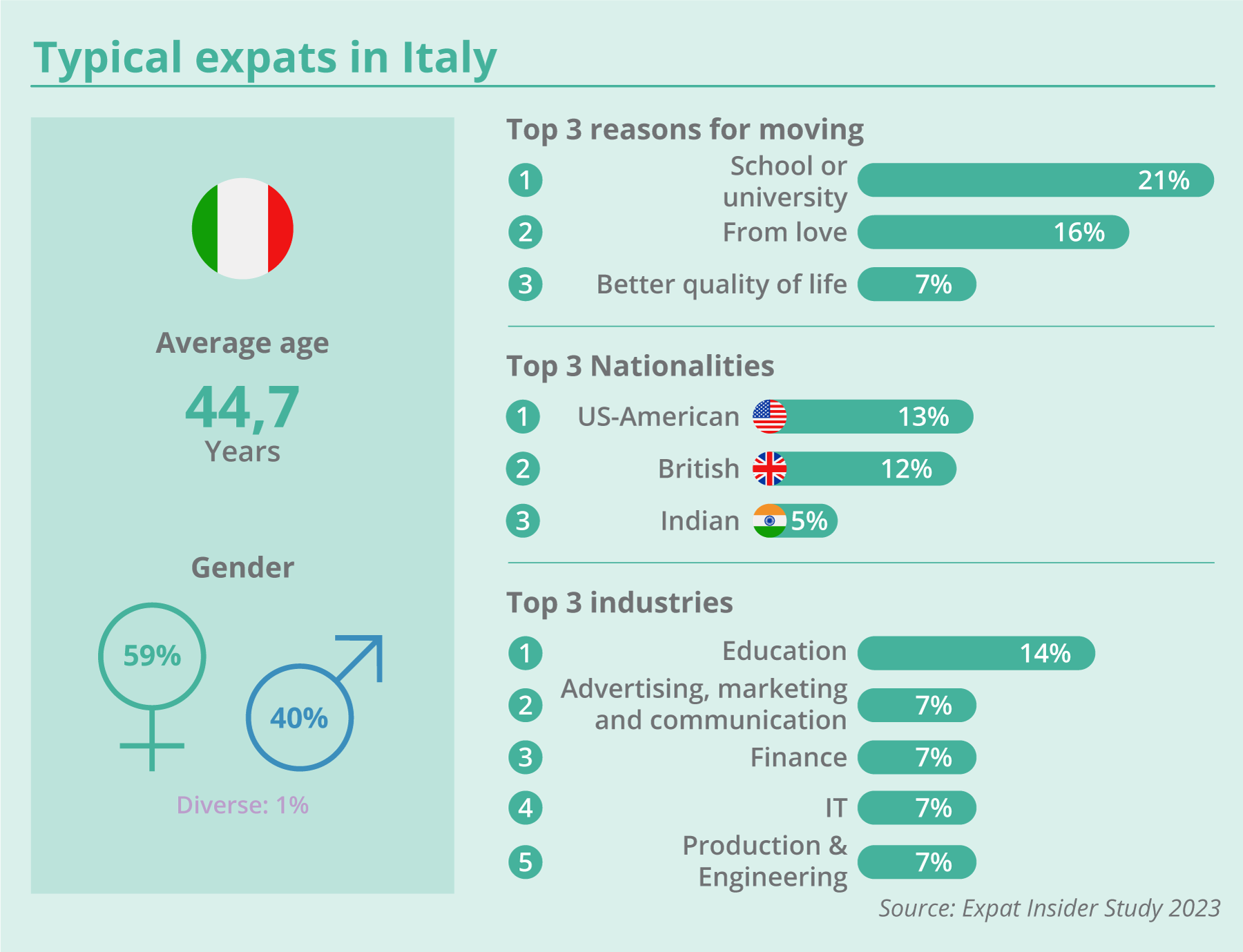
In Italy, it also appears challenging to navigate life as an expat. The country ranks 51st in the Expat Essentials Index and is second to last in the Administrative Factors subcategory: 72 percent of respondents find dealing with bureaucracy difficult, nearly double the global average (38 percent). Overall, 71 percent of expats are satisfied with their life in Italy.
8. Malta: Poor pay for expats
Expats in Malta suffer the most from low quality of life: They rate the opportunities for outdoor activities particularly poorly (32 percent dissatisfied vs. 10 percent globally) and the road infrastructure (61 percent dissatisfied vs. 13 percent globally). The Environmental & Climate subcategory is also a concern: Malta ranks second to last in both the Natural Environment and Urban Environment factors.
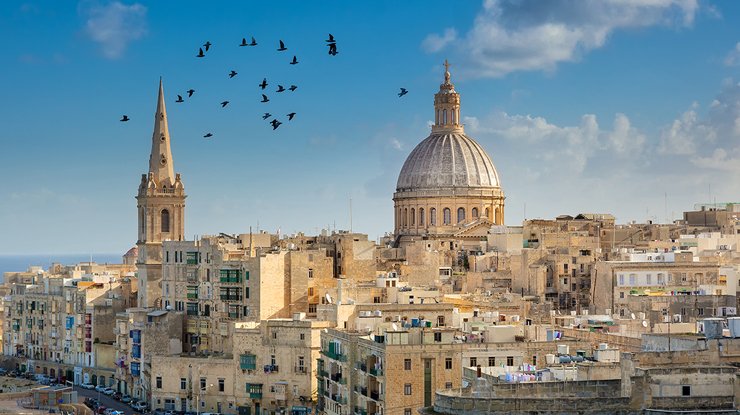 La Valetta, Malta © Anton Zelenov, AdobeStock
La Valetta, Malta © Anton Zelenov, AdobeStock
Unfortunately, Malta's results in the Working Abroad Index are not much better: 24 percent feel they are not appropriately compensated for their work, and 17 percent see no purpose in their jobs. On the other hand, more than half of expats (58 percent) are satisfied with their financial situation, which is exactly in line with the global average.
9. New Zealand: Last place for personal finance
New Zealand's results in the Quality of Life Abroad Index have their ups and downs. It is rated worst in the Travel & Transportation subcategory (ranked 50th): 38 percent of respondents complain about the lack of public transportation, more than twice as many as the global average (16 percent). Another 24 percent feel that it is not affordable enough. New Zealand also ranks last in terms of travel opportunities worldwide, most likely due to its isolated location. However, expats in New Zealand highly appreciate the environment and climate (ranked 8th).
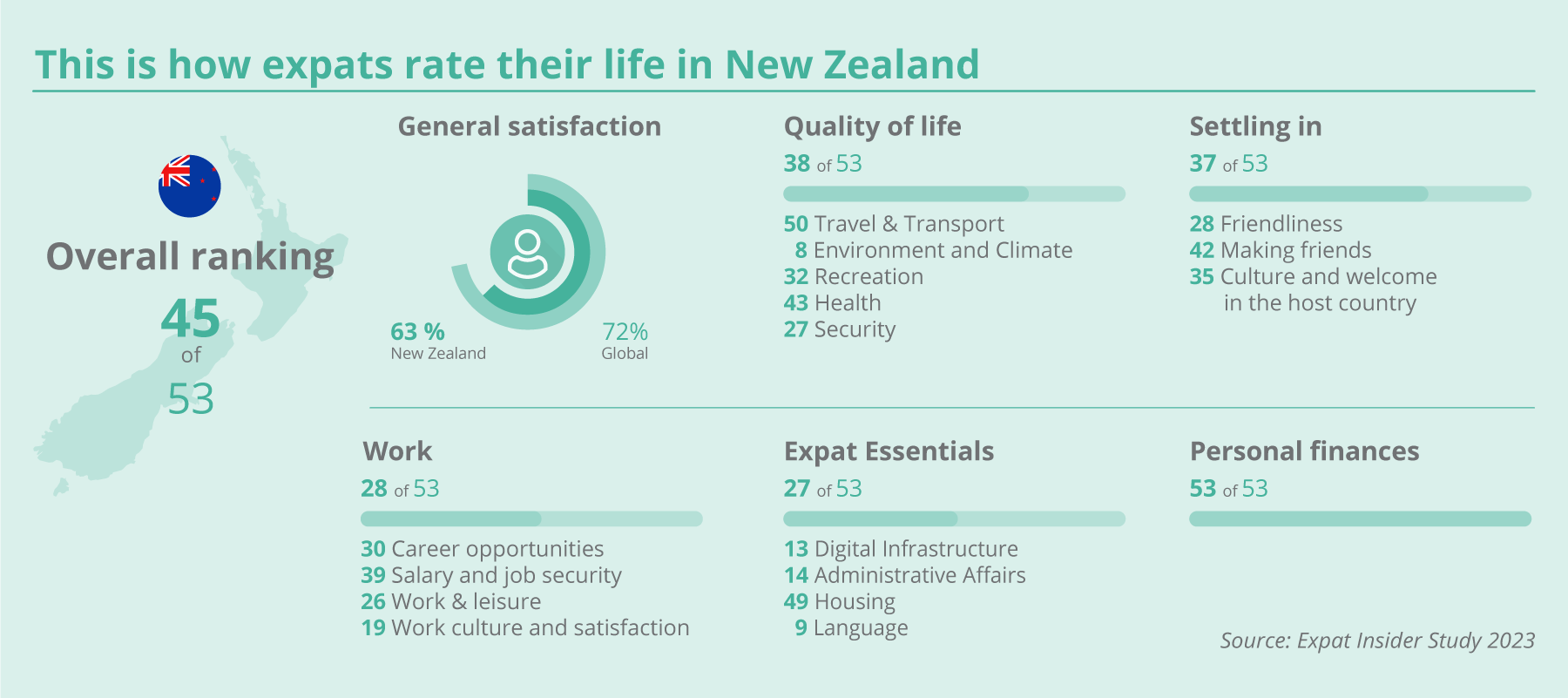
In New Zealand, while it ranks in the global midfield when it comes to working abroad, it occupies the last place worldwide in the Personal Finance Index. Expats believe that their available household income is insufficient for a comfortable life, and they are dissatisfied with their financial situation. Furthermore, 64 percent of them are concerned about the high cost of living, which is nearly 30 percentage points higher than the global average of 35 percent.
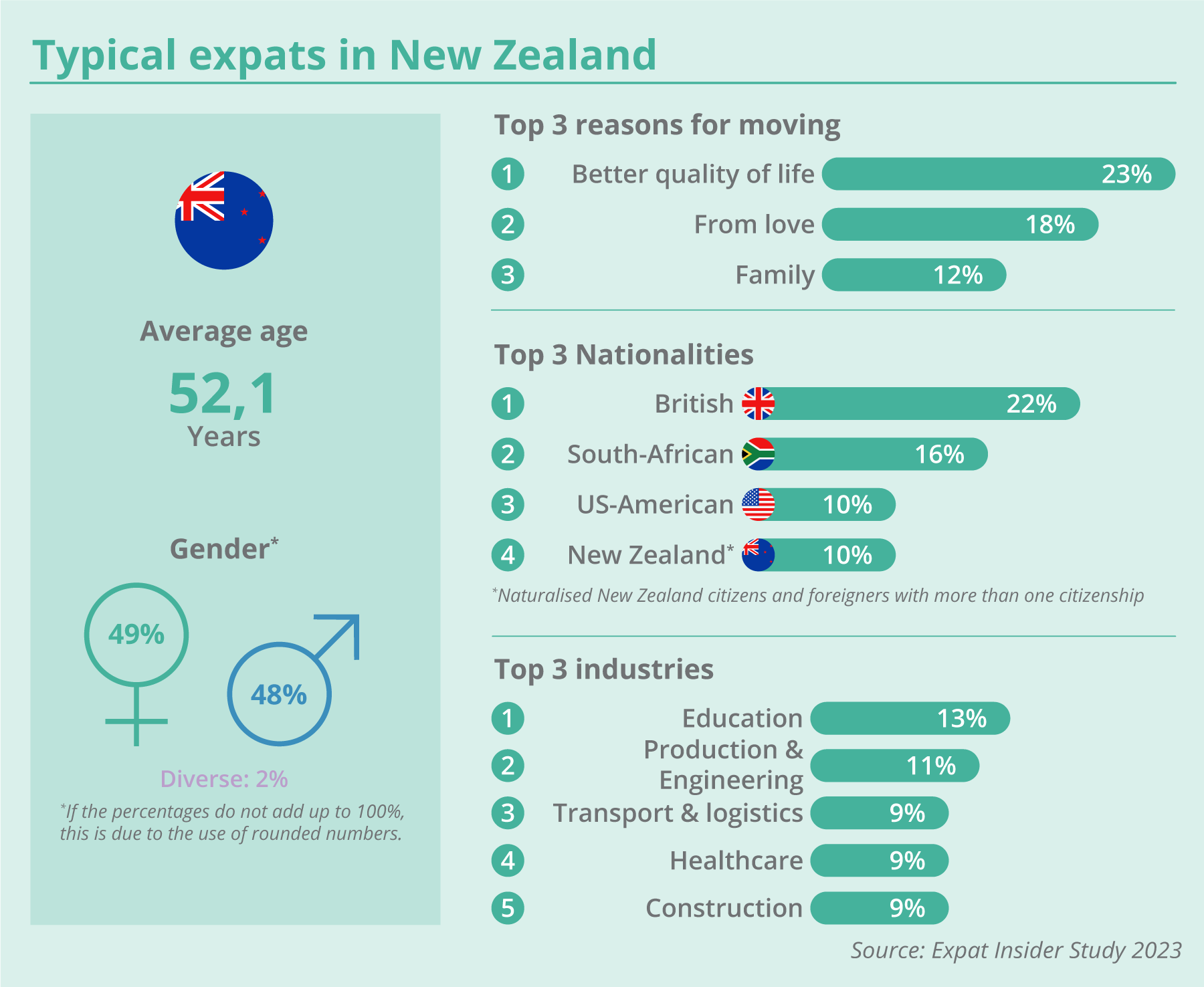
The Expat Essentials Index also highlights significant contrasts that shape expat life in New Zealand. The digital infrastructure is a real highlight: expats can easily make cashless payments and appreciate unrestricted access to online services. However, obtaining a visa for relocation can be challenging. Housing is another issue in New Zealand: expats describe apartments as hardly affordable (71 percent dissatisfied vs. 42 percent worldwide) and difficult to find (45 percent dissatisfied vs. 31 percent worldwide). Overall, only 63 percent of expats are satisfied with their life in New Zealand.
10. Japan: Expats have great difficulty making contacts
Japan performs worst in the Expat Essentials Index. More than three out of five expats (62 percent) find it difficult to live in Japan without knowledge of Japanese, nearly twice as many as the worldwide average (32 percent). The Expat Insider Index reveals further disadvantages in terms of settling in: 57 percent have difficulties making friends, and twice as many as the global average find it challenging to adapt to the local culture (36 percent vs. 18 percent worldwide).
59 percent miss creativity and flat hierarchies in the local working environment. Another 49 percent criticize the lack of flexibility and opportunities for independent work (59 percent vs. 26 percent worldwide). The result: Japan ranks last globally in the subcategory of Working Culture & Job Satisfaction. Japan also ranks among the three worst countries worldwide in terms of working hours and work-life balance.
However, in the subcategory of Healthcare, the country makes it into the top 10 (7th place). Despite the overall lower ranking, 75 percent of expats are satisfied with their life in Japan.


